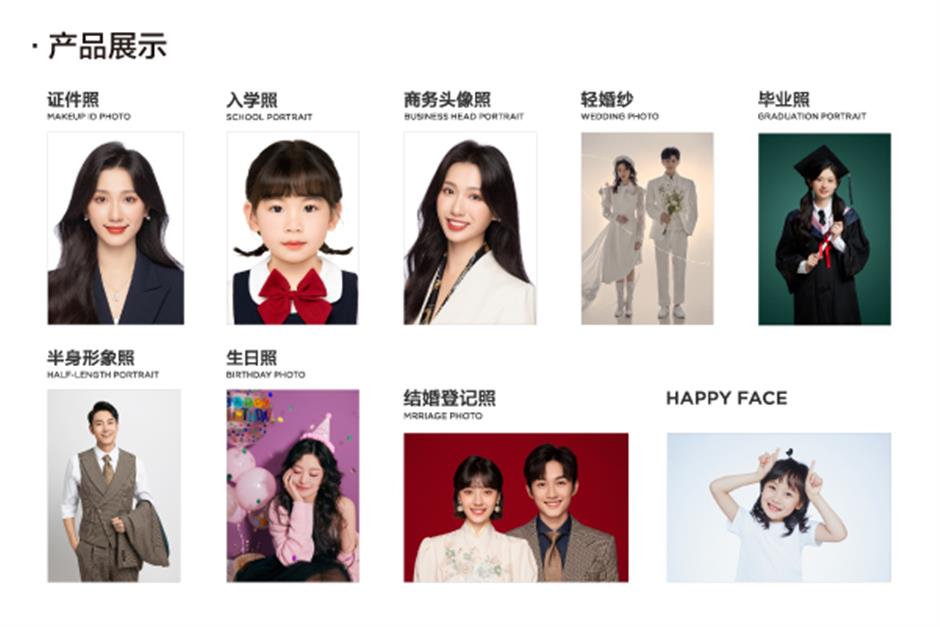Thriller or booster? How AI transforms traditional photography studios
Traditional photography studios are still expanding and opening more stores, despite the debuts of artificial intelligence algorithms that are claimed to "generate" portrait photos online within seconds.
The opinion that "generative AI will replace offline photography studios " is groundless, at least in the near future, Shanghai Daily learned at a recent industry exhibition.
Photo & Imaging (P&I) Shanghai 2023 attracted photography studios, camera and accessory vendors, and service providers including AI algorithm developers. The three-day event, held last week in Shanghai, had over 80,000 visitors.

The booth of Naive Blue attracts many visitors in the P&I show held in Shanghai earlier this month.
Naive Blue, which operates more than 100 boutique photography studios to create the "most beautiful ID photos," did not seem overly worried at the show about its generative AI rivals. These include Miaoya, an Alibaba-owned app which allows users to generate a digital and optimized portrait photo by uploading 20 of their own pictures for a cost of only 9.9 yuan (US$1.36).
"You can clearly see the 'AI style' of those digital clones," a staff member of Naive Blue who declined to be identified told Shanghai Daily. "Obviously, we serve different customer groups."
Customers of Naive Blue, whose shops are often located in popular shopping centers, are willing to pay at least several hundred yuan, or even thousands of yuan, at the studios. The cost includes clothes, make-up and fine-tuning by experienced photographers and editors, much more than AI offers, the staff member stressed.
Customers are normally young women having photos taken for "meaningful moments and memories," such as university graduation, birthdays, or a first professional portrait for their LinkedIn profile and resumes. In August, Naive Blue opened its first store on Chongming island in Shanghai.

EasyFast services cover IDs, birthdays, weddings, and portrait photography, with affordable prices and fast processing methods.
EasyFast, a sub-brand of Naive Blue with over 600 outlets nationwide, was actively seeking more franchise partners at the show. With the slogan, "Make photographers richer," it received many inquiries and applications at the P&I show.
Comparatively, EasyFast is a community photography kiosk brand, which offers ID and visa photo services at affordable prices, starting from 50 yuan.
It has developed an AI photo optimization system for people to start their own business as soon as possible. This offers seven days of training for all franchise partners, primarily in camera operation and simple make-up services. People without photography editing experiences can rely on the AI optimization system, Shanghai Daily learned at the EasyFast booth.

Many people visited the EasyFast booth to inquire about franchise programs. The company aims to provide good photo services near home.
Portrait photographers and studios are believed to face potential threats from AI algorithm programs like Miaoya, which made its debut in July and soon became a popular service.
Some people even believe that Miaoya could replace the services developed by Himo Photo Studio and Naive Blue, leading to a debate of "It's a photo of you, but does it capture your true essence?" that was reported by Shanghai Daily previously.
Compared with studio photos, those produced by Miaoya are not parallel in the level of high-resolution, diversification, and there is no chances that studio staffers can provide clothing and makeup, along with a tips session if needed to help people relax in front of the lens.
Earlier this week, officials from Miaoya said that does not intend to replace offline photo studios, but to enrich the service methods to meet demand from those who are unable to access or afford photography studios.

AI photo service Miaoya helps people generate photos online.
Also facing the trending generative AI wave, Meitu, China's most popular portrait and selfie optimization app, had its own response.
During the P&I show in Shanghai , Meitu showcased its latest AI processing and finetuning tool Yunxiu Pro for the commercial photography market. It provides high-quality image processing services and shortens the photo preview time to promote the digitalization of the industry
In on-site demos in Meitu's booth, users could optimize the look of their skin and face with one-click adaptations within seconds. Comparatively, it often takes at least five to 10 minutes to process each photo even by experienced experts in the studios.

Meitu showcases its AI photo processing service Yunxiu at the show.
Currently, Yunxiu helps studios to greatly cut costs and time when finetuning photos, and is used by 30,000 commercial photography organizations, covering career photos and photography services for tourists, children and pets. Annually, more than 500 million pictures are processed by Meitu Yunxiu, the company said.
The cost of each photo processing is less than 0.3 yuan using Meitu Yunxiu. Comparatively, each option, such as a change of background color, costs customers 30 to 50 yuan additionally, which boost profit margins for studios, Shanghai Daily learned.
It is an industry with great potential as China added 350,000 new commercial photography studios in 2022, with a rapid growing market value expected to reach 700 billion yuan by 2026, experts said at the P&I show.















